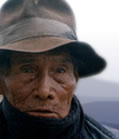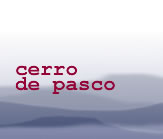 |
 |
||
 |
|||
|
RELATED THEMES development employment and income industry OTHER LOCAL THEMES BACKGROUND |
economics
Most narrators say their parents and grandparents were able to make a better living from farming. Yet times were still tough and food shortages not unknown: "I remember my grandmother told me that at one time they had nothing to eat because there was no harvest because of the drought. They would take the cactus.cut the stem, remove the needles and drink the liquid because there was no water" (Peru 17). Nor is migration for economic reasons a recent phenomenon: "Sometimes the livestock isn't enough to support the families. You see we've got big families. I think [migration] always happened though, of course, not as much as now. I've got uncles far away, in other cities. My relatives, just like other families, have been to seek their fortune in other cities" (Peru 7). Some took jobs elsewhere but retained the farm: "In those days each farmer had to see to his own needs, money was scarce and didn't go far enough. So my dad decided it was better to work in La Oroya to get more money to put into the cattle and the crops. My mum was in charge of the cattle, the crops and everything. My father.returned to [to the farm] every Saturday and Sunday. He didn't leave his farm" (Peru 24). What is clear is that people were more self-sufficient, in terms of both food and material goods, and many more could survive on farming alone, whereas now "people who work the farm do it as an extra, they have to work in the mine or in transport too. You can't live from farming anymore the way our grandparents did" (Peru 23). All say that it is the pollution of pasture and water supplies which has caused the collapse of farming: "how can people graze and rear livestock? This is what's changed, I think. Now, because there's not enough being produced [through herding], people start to trade things, they become traders and travel carrying goods. Some don't come back. This is new as well." Several speak with pride of the old cottage industries: "Earlier. there was so much of what we call artisania, wool obviously, wool from the sheep, wool from vicuñas. These days nobody ever uses wool. Now you can't make anything and you have to buy things made in the cities" (Peru 8); and "I told you that before there was wool in abundance, the crafts were famous as well, not like now. people came to buy, for example from Huancayo, from Jauja. We used to exchange things: they brought vegetables, clothes; from here they took meat, wool and weavings. Nowadays we see two or three little shops; before, all these [streets] were full of shops" (Peru 10). There are many attempts to reverse the economic decline and several narrators, for example Peru 7, describe new economic activities which the communities are trying to develop: dairies, bakeries, small weaving and textile businesses, and raising guinea pigs (for food). But investment remains a problem: "when there isn't a lot of money you can't make all the necessary improvements. Since we're just comuneros, nobody wants to lend us money, nobody wants to take risks with us" (Peru 10). quotes about economics"We only possess a small amount of livestock, because of the fumes, which cause an illness which kills.To prevent this we need a cure, but these days medicine costs so much, too much, and you can't survive. No comunero, for example, has any more than 100 sheep these days, when before they used to have 500, 600 or 900.My parents had quite a lot of animals, my grandparents as well. I remember in those times, for example, my grandfather had a room like a larder where he just kept provisions: rice, sugar, fruit, potatoes, and in another room there was meat and you could walk in like a wardrobe and take it out. But these days, who has meat in store? Nobody.It's not like before when.families had more resources.." ".things have changed a little. For example there's less livestock, that's for sure... Now there's more destitution, a lot of poverty. Take an example, there didn't use to be an organisation called Vaso de Leche. Everybody had resources and it wasn't necessary then. Now, yes, there's a need. it's an organisation we've created ourselves. to make sure that none of the children in the community goes without milk. that the children at least have something for breakfast." "Quite a few, a lot, as many as 10% [of people have subsistence problems]. There's a lot of poor people. Then there are the widows who've been left with five or six children. Every fortnight the community, the council or the cooperative gives them some support; in the meanwhile they give them food, sometimes they give them work eventually here in the cooperative. This is the kind of support they offer because the community cares about its children." "Everything is linked to Centromin. When Centromin is going through good times, La Oroya grows, sales grow, but when Centromin is going downhill, La Oroya shrinks.I remember when [structural adjustment], known as Fujishock, was applied in 1990... after that things in La Oroya changed. Nobody had enough money.Prices went up tenfold, I can't remember correctly. Centromin went through a tremendous crisis. They started firing people." ".the Yanahuanca. is where our customs and traditions are best kept. Even food, because most of the people of the highlands don't use much from other areas, things which have been prepared or put into jars. They don't use money much, they don't have much experience in transactions and that's why they are often taken advantage of. If you eat there they'll give you potato, beans, wheat, barley all made in different ways - local dishes." |
|